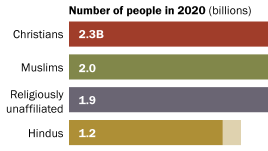
Many Religious ‘Nones’ Around the World Hold Spiritual Beliefs
Despite their nonreligious identity, many unaffiliated adults hold spiritual or religious beliefs. About a fifth or more in 22 countries believe in an afterlife, for example.
Numbers, Facts and Trends Shaping Your World
Despite their nonreligious identity, many unaffiliated adults hold spiritual or religious beliefs. About a fifth or more in 22 countries believe in an afterlife, for example.
All
Publications
Highlights from the Pew Research Center report, Muslim Americans: No Signs of Growth in Alienation or Support for Extremism.
As the 10th anniversary of the 9/11 attacks approaches, a comprehensive public opinion survey finds no indication of increased alienation or anger among Muslim Americans in response to concerns about home-grown Islamic terrorists, controversies about the building of mosques and other pressures that have been brought to bear on this high-profile minority group in recent years.
Restrictions on religious beliefs and practices rose in 23 of the world’s 198 countries (12%), decreased in 12 countries (6%) and remained essentially unchanged in 163 countries (82%) between mid-2006 and mid-2009, a new Pew Forum report shows. More than 2.2 billion people – nearly a third of the world’s population – live in the 23 countries with increasing government restrictions or social hostilities involving religion.
Muslim and Western publics continue to largely agree that relations between them are poor, and disagree about who is at fault – Muslims largely blame Westerners, while those in the West generally blame Muslims. However, in both Western and predominantly Muslim nations, there is a shared concern about the threat posed by Islamic extremism.
By Carroll Doherty, Associate Director, Pew Research Center. Special to the New York Times. For more debate on Mormon candidates in the 2012 election click here. Overall, being a Mormon is hardly an asset for presidential candidates, but it is not a deal-breaker for most Americans. A quarter of Americans say they would be less […]
Washington,D.C. — In a new surveyby the Pew Research Center’s Forum on Religion & Public Life, most evangelicalProtestant leaders who live in the Global South (58%) say that evangelicalChristians are gaining influence on life in their countries. By contrast, most leaders who live in the Global North (66%)say that, in the societies in which they […]
Christians remain the largest religious group, and Muslims grew the fastest from 2010 to 2020. Read how the global share of Buddhists, Hindus, Jews and the religiously unaffiliated changed.
Most who use astrology (or a horoscope), tarot cards or a fortune teller say they do so just for fun rather than for insights about life.
After years of decline, the U.S. Christian share now shows signs of leveling off. The new Religious Landscape Study explores trends in identity, beliefs and practices.
The Global Religious Futures (GRF) project is jointly funded by The Pew Charitable Trusts and The John Templeton Foundation. Here are some big-picture findings from the GRF, together with context from other Pew Research Center studies.





